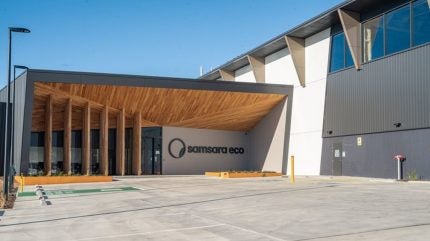
The newly established headquarters and production site plant will enhance the company’s capacity to manufacture materials that are equivalent to virgin quality and have a low carbon footprint.
These materials include recycled forms of nylon 6,6 and polyester, which have a wide range of applications across various industries such as clothing, packaging, and automotive.

Discover B2B Marketing That Performs
Combine business intelligence and editorial excellence to reach engaged professionals across 36 leading media platforms.
The facility is equipped with Samsara Eco’s enzymatic recycling technology EosEco, which leverages enzymes engineered through AI to decompose mixed plastics that would otherwise end up in landfills.
The resulting recycled raw materials can then be integrated into new product lines by brands, the company said.
Additionally, the site features advanced enzyme production capabilities, allowing the company to further refine its AI-driven platform for enzyme discovery and development.
Samsara Eco CEO and founder Paul Riley said: “The opening of Jerrabomberra is a proud milestone for us and the broader circular economy. In just four years, we’ve scaled from bench research through to pilot, demonstration, and now our first plant. This is a true tipping point for circularity, shifting circular materials from early-stage innovation to mainstream reality.

US Tariffs are shifting - will you react or anticipate?
Don’t let policy changes catch you off guard. Stay proactive with real-time data and expert analysis.
By GlobalData“Brand demand and supportive new regulations are helping to clear the path forward. Our new facility will help brands deliver circularity with the capacity to produce the equivalent of hundreds of thousands of garments annually.”
Global brands like Lululemon are set to incorporate the circular materials produced at Jerrabomberra into their forthcoming product collections.
In June this year, Samsara Eco formalised a 10-year offtake contract with Lululemon to secure the supply of sustainable nylon and polyester.
The facility will also serve as a venue for pioneering research endeavours, including collaborations with The LYCRA Company on recycling solutions for spandex and with Deakin University’s Recycling and Clean Energy Commercialisation Hub, which is part of the Australian Government’s Trailblazer Universities Program.
Samsara Eco said it remains active in addressing the challenge of textile recycling, where currently only approximately 10% of plastics are recycled globally, and less than 1% of textiles are turned back into new textile products.
The Jerrabomberra site also lays the groundwork for Samsara Eco’s upcoming commercial nylon 6,6 plant in Asia, set to open in 2028.
Developed with engineering partner KBR, this 20,000 tonne facility will be the first in a series of international commercial sites utilising EosEco technology to convert waste into materials identical to virgin raw materials.
Samsara Eco’s new plant opening has garnered support from an investor consortium including Main Sequence, Temasek, Greycroft, and Hitachi Ventures.
Hitachi Ventures associate Jan Marchewski said: “This hub will enable Samsara Eco to test AI-discovered enzymes at scale in collaboration with partners, further cementing its market leadership in enzymatic recycling.”





